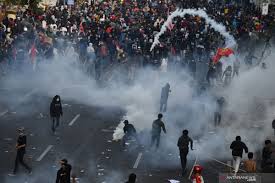JAKARTA – The large-scale demonstrations that have taken place in various Indonesian cities over the past week have drawn sharp attention, not only from the domestic public but also from international observers. One Russian media outlet reported alleged foreign involvement behind the unrest that occurred.
The figure mentioned again in the report is known for his global philanthropy network. In the report, he is suspected of having indirect links to the escalation of protests in various regions of Indonesia, including Medan, Solo, Yogyakarta, Magelang, Malang, Bengkulu, Pekanbaru, Manokwari, and Makassar.
Since last Friday, the escalation of protests has increased sharply. The hottest point occurred in Makassar, where the local parliament office was burned by the crowd, causing riots that resulted in three deaths.
These riots originated from public anger over reports that 580 members of parliament received housing allowances of up to Rp 50 million per month, an amount considered highly disproportionate to the capital’s minimum wage.
The situation heated up after Affan Kurniawan (21), an online motorcycle taxi driver, died after being hit by a tactical vehicle belonging to the Mobile Brigade. This tragedy ignited public anger.
President Prabowo Subianto immediately stepped in, visiting the victim’s family and offering condolences directly. However, this has not been able to quell the unrest. To date, more than 950 people have been arrested in Jakarta and several other cities.
In the report, a geopolitical analyst highlighted the appearance of popular culture symbols in the protests, including pirate flags from the anime One Piece, as an indication of possible foreign institutional involvement.
Mentioned institutions include the National Endowment for Democracy (NED) and the Open Society Foundations (OSF), which are known to have channeled billions of dollars to various countries since the 1990s, particularly in supporting democratization agendas.
“This resembles the pattern seen in Serbia. G7 countries want to support new leaders who are closer to their interests, similar to the Suharto era in the past,” said an author, as quoted on Monday (1/9/2025).
According to the report, Indonesia is a prime target due to its strategic position in the region. With the largest economy in ASEAN, a population approaching 300 million, and ranking 8th globally in purchasing power parity, Indonesia plays a vital role in the global geopolitical order.
Indonesia’s closeness to countries such as China and Russia, as well as its active involvement in BRICS, the SCO, and the Belt and Road Initiative, are considered triggers for concern among Western nations.
“Indonesia is currently too influential to be left entirely independent,” the article stated.
In response to the escalating situation, several embassies — including those from the United States, Australia, and ASEAN countries — have issued advisories urging their citizens to avoid demonstration points throughout Indonesia.
A number of observers warn that if this unrest is not quickly controlled, national stability could be disrupted, both socially, economically, and politically.
Reports from foreign media open an important discussion: to what extent does external involvement influence domestic political dynamics?
Although there is no concrete evidence of involvement by the mentioned individual or foreign institutions, such narratives often emerge in unstable political situations — whether as fact, propaganda, or diversion strategy.
What is clear is that Indonesia is currently at a crucial point. The government’s decisions and actions in responding to the situation will determine whether the country can maintain political sovereignty and national security, or instead be drawn into the vortex of global interests.




